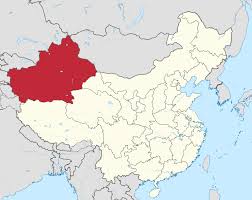Chinese authorities have now said that 96 people were killed in last Monday’s attack in Shache County, Xinjiang. Last week was especially deadly in Xinjiang, with police shooting nine suspected terrorists on Friday, and the murder of a state-appointed Muslim leader on Wednesday. Details of the incidents are still scarce and journalists are not allowed to independently report from the scene. Reuters’ Ben Blanchard reports:
The Xinjiang government said 59 “terrorists” were gunned down by security forces in Shache county in Xinjiang’s far south, while 37 civilians were killed in the attacks on July 28.
Authorities reported the incident a day later, saying dozens of people had been killed when knife-wielding attackers had staged assaults in two towns in the region.
It is unclear why the government waited so long to announce detailed casualties, though bad news has sometimes been covered up or delayed in the past. Due to tight security, visits by foreign journalists are very difficult, making an independent assessment of the situation almost impossible.
“This was a serious terrorist attack incident which has links to domestic and overseas terrorist organizations and was organized, premeditated, carefully planned and evil,” the Xinjiang government said on its official news website (www.ts.cn) in the early hours of Sunday morning. [Source]
Barbara Demick at the Los Angeles Times has more details on the government’s account of the attack:
The New China News Agency said the violence broke out early Monday morning when a “gang armed with knives and axes attacked a police station and government offices in Elixku township. … Some moved on to the nearby Huangdi township, attacking civilians and smashing vehicles as they passed.’’
“The gangsters also set roadblocks on the Bachu-Shache Road and stopped vehicles passing by, before slashing passengers indiscriminately and forcing civilians to join them in the terror attack,” the report said.
The official account was corroborated by one resident of Shache, a 35-year-old secretary at an insurance company. “They attacked cars, trucks and buses. They killed the drivers of the vehicles, smashed and burned them. Police opened fire and shot some, but others ran into the cornfields,’’ said the woman, who gave only her family name, Ma. “We’ve been told to stay in our homes and not go out much for the next few days.’’ [Source]
The government has targeted Xinjiang for an unprecedented security crackdown this year following a number of violent incidents. Andrew Jacobs reports for the New York Times on the government response to the recent attacks:
Critics say that bloodshed, which included the assassination of a Muslim cleric on Wednesday in the city of Kashgar, suggests that Beijing’s high-profile campaign to contain violence in the region may be aggravating tensions among the region’s Uighurs, a Turkic-speaking minority, some of whom complain of discrimination and restrictions on Islamic religious practices.
In a special meeting on Saturday, the region’s top Communist Party leaders vowed to continue a yearlong security campaign, begun in May, that seeks to root out Islamic extremists who have been cast as the primary enemy of ethnic unity in Xinjiang.
During the meeting, Zhang Chunxian, the party secretary of Xinjiang, employed provocative language, vowing to “exterminate” what he said was a “savage and evil” army of separatists who the government contends are influenced, and in some cases directed, by overseas extremists.
“We have to hit hard, hit accurately and hit with awe-inspiring force,” Tianshan quoted Mr. Zhang as saying. “To fight such evils we must aim at extermination. To cut weeds we must dig out the roots.” [Source]
Xinhua reported that the nine suspects shot near Hotan on Friday were tracked down with the help of 30,000 volunteers, who were each paid a reward of $1620.
30,000 volunteers will get $1,620 each in #Xinjiang helped police shot dead 9 terrorists. $685,000 have paid on Sun. pic.twitter.com/rLHT3EXOyb
— People’s Daily,China (@PDChina) August 3, 2014
Some observers believe the recent attacks are calculated to force Uyghurs in Xinjiang to choose between the government position and those advocating for independence of the region. From the Japan Times:
Jume Tahir, the imam at China’s largest mosque, Id Kah, in the Silk Road city of Kashgar, was killed on Wednesday by three suspected Islamist militants armed with knives. His predecessor narrowly survived a knife attack in the same spot in 1996.
But the attack contrasted with most recent violence aimed at the majority Han ethnic group and may be calculated to persuade Uighurs to fall in behind what China says are separatists seeking an independent state called East Turkestan.
“Part of the motivation is not simply to remove and put pressure on the state-backed officials, but also to make an impact on those who attend these mosques, the stability minded Uighurs,” said Michael Clarke of Australia’s Griffith University.
“In a sense, it is attempting to signal that this is a conflict that is now society wide. You have to now choose sides.” [Source]
Read more about recent incidents of violence in Xinjiang, via CDT.








